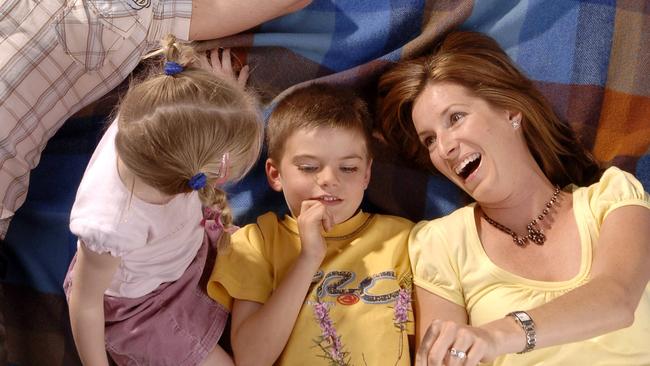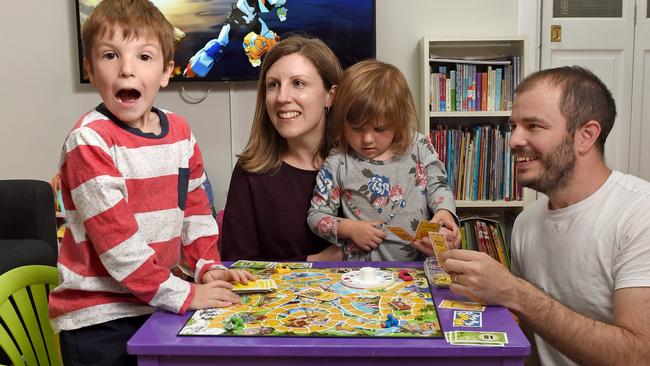Judith Locke: How to help kids cope in difficult times
In tough times, children are often deeply impacted. They see the people around them behave differently and they can get worried. Dr Judith Locke has tips on how to help them cope.
Rendezview
Don't miss out on the headlines from Rendezview. Followed categories will be added to My News.
It’s been a challenging couple of months.
With the droughts, the bushfires and now COVID-19 it’s been a scary time for people directly and indirectly impacted by these events.
We are now at a particularly critical time with the pandemic, where our lives are being
impacted by issues such as cancellations, financial impacts, panic buying problems, and a
general feeling of uncertainty about what the future will hold.
At times like these children are often especially impacted. They see the people around them
behave differently and they can pick up enough information to get very worried about what
is going to happen.
So, it is essential that you talk to them about their concerns. Here’s some things you can do
in a discussion about the pandemic or any event which makes them overly worried.

Check their understanding
Ask them first what they have heard. Make sure you correct any misunderstandings, such as
their mistaken belief that everyone is going to become ill.
Answer their questions or correct their misunderstandings
Essential here is that you use age appropriate words and content for your child. Give them
the information you think they can handle and try talk about things that might make them
worry more – such as future recessions etc. Try to reassure them a little with some facts,
such as the low severity of the illness in children or the improbable likelihood of a bushfire
in a city.
Stay calm
It is essential that you look composed and calm in this conversation. Children can cope with
challenge, but if they get the sense that their parent is overwhelmed, then it will be much
more impactful on them. Do your best to put on your unruffled poker face here and use
your most reassuring voice with them – they will take their cues from you.
Normalise their fear
Listen to their concerns, talk about their feelings, and normalise their responses as being
typical. ‘Sounds like you are feeling a little worried, and you know, that is completely
understandable and very normal in situations like this.’ Let them know if their fears are
possibly greater than the situation demands, by calmly giving them more realistic facts and
probabilities.

Give them something to do
Tell them that while worry might feel like they’re doing, it doesn’t really help anything. It’s
better to do something useful that truly helps.
Discuss the truly effective things to do in a pandemic – such as limiting your closeness to
others by keeping some distance from other people outside of the house, sneezing or
coughing into a tissue or elbow, and washing your hands regularly throughout the day.
Get them to choose a song to sing or hum for 20 seconds to ensure that they wash their
hands thoroughly. Do some research with them to find out what chorus of a favourite song
goes for that amount of time. (“Let it Go” goes for about 25 seconds.)
Brainstorm other ideas, such as not overusing toilet paper because of the shortage.
Manage what they hear
Ideally, watch the news away from your child, so that they are not unduly worried by what
is said. Try to talk about other, more pleasant things also. Too much focus on horrible
situations can make us all feel even more overwhelmed.
Do something fun
Play a family game of Monopoly, get out the Twister set, or watch a favourite comedy
together.

Get them to think about the community
Brainstorm ideas of how the family can help others such as donating some toys or money to
charity. Or offer to do some shopping for an elderly person in your neighbourhood.
These are tricky times. To get through them, we need to use the best parts of ourselves to
take care of each other and work together.
Takeaway for parents
Some children are becoming very fearful of the potential impact on an older member of the
family. Here’s what you can do.
* Talk to your child about their fears.
* Reassure them about the steps the family member is taking to stay safe – E.g.
Grandparents could phone your child to confirm what measures they are taking.
* Get the family member or friend to reciprocate the question to your child, ‘So, Ash
what are you doing to stay safe?’
* Get your child to think of things they can do to make them feel happy and less lonely
if they are isolated – draw them a picture, write a cute letter, or phone them every
day or two to check on them.
Originally published as Judith Locke: How to help kids cope in difficult times


